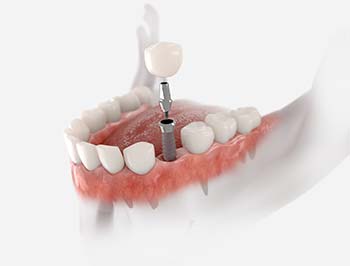
Patient Info
Dental Implants
Cosmetic Dentistry
General Dentistry
Restorative dentistry is a field of dentistry that focuses on restoring a damaged smile. You may have missing or damaged teeth and need replacements. The best option for tooth replacement is dental implants because they look, feel, and function the most like natural teeth. One of the most common questions that patients ask Dr. Byron Scott at Springhill Dental Health Center is: are dental implants painful?
In this article, we’ll explain more about what dental implants are, how they work, and what you can expect when you get dental implants.
 Dental implants are a restorative dental procedure that looks, feels, and functions like natural teeth.
Dental implants are a restorative dental procedure that looks, feels, and functions like natural teeth.
Tiny metal screw that is inserted into the gum and jawbone, acting as an artificial tooth root.
The piece that secures the implant screw to the artificial tooth/teeth.
For a single-tooth implant, a crown will be attached. If you are missing several or all of your teeth, 2 or more implants will support a bridge or full arch.
Another option is mini dental implants, which only have two parts. The screw and abutment are one piece. This is ideal for patients who do not qualify for traditional dental implants.
When you are missing teeth, your jawbone begins to deteriorate, sending those resources to other areas of your body. Unfortunately, this can lead to additional issues such as gum disease due to gums being more exposed to bacteria, additional tooth loss, tooth misalignment as remaining teeth shift into the open space, and facial changes because you no longer have the support of your teeth. Dental implants can change all of that by restoring the stimulation lost due to missing teeth.
The process for getting dental implants typically takes a minimum of several months because you must heal between steps.
The first step is your initial consultation. This will include a comprehensive exam and imaging, which will help us determine the condition of your mouth and whether or not you need any additional procedures. If you need extractions, gum disease treatment, or bone grafting, those will be scheduled first. Once you heal from those, the implants can be placed.
We start by making an incision in your gum and drilling a tiny hole in your jawbone. The implant screw is placed and you will be sent home to heal. During this time, osseointegration will be taking place, which secures the screw to your jawbone.
Once you have healed from that, the incision will be opened back up and the abutment will be placed. At this time, we will order your artificial tooth/teeth. You can choose the material that you prefer and the color will be matched to the rest of your teeth. Healing from this step usually only takes a couple of weeks.
Finally, once we receive your restoration, you can return to the office to have it fitted and secured.
The process of getting dental implants does require oral surgery. Many people believe that since it is a surgery, they can expect it to be painful. In the past, that may have been true. However, thanks to advancements in dental technology, we are able to perform most procedures, including oral surgery with little to no pain.
You will be given a local anesthetic to numb the area before we get started. If you have dental anxiety, make sure that you mention this during your consultation. This will allow us to include sedation in your treatment plan. Most dentists offer oral or IV sedation, and you can choose conscious sedation, or you can choose to sleep through the entire procedure.
Once the anesthesia begins to wear off, you may have some discomfort. This is due to the nerve endings “waking up” and having your mouth open for an extended period of time. You should not experience any significant pain. If you do, contact the office and let us know.
If you are missing one or more teeth, you might want to consider dental implants to restore your smile. Dr. Scott at Springhill Dental Health Center in Mobile, AL has the experience and expertise to successfully place dental implants - his many recognitions and achievements in this area prove his expertise. Our office is located on Springhill Avenue in Mobile, AL. Our office hours are Tuesday through Thursday from 9:00 AM to 5:00 PM.
My visit was incredible. I had my “All on Four” appliances cleaned, and it was a painless and thorough experience. Dr. Scott and all his staff are very friendly. During the cleaning, Mary was gentle and let me know everything she was doing and how it would feel. She gave me tips on how to clean my implants/appliances better and gave me a small brush to do the underside more effectively. Dr. Scott and Mary suggest cleanings take place every 3 months so I will be back in December.

Dr. Byron Scott is a highly-trained and accomplished dentist. He attended The University of Alabama School of Dentistry and subsequently completed numerous Advanced Studies and Trainings. Dr. Scott is Board-Certified by The Academy of General Dentistry and has earned Mastership status (MAGD), an honor shared by only 1% of dentists. He has numerous memberships and associations, including Diplomate status with The American Board of Oral Implantology (D-ABOI) and The International Congress of Oral Implantologists (D-ICOI). Overall, Dr. Scott has dedicated his life and career to helping patients improve their oral health through expert dentistry. His goal is to help each patient keep their smile healthy, attractive, and comfortable for the duration of their lifetime.
